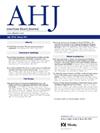Effects of a preoperative psychological expectation-focused intervention in patients undergoing valvular surgery - the randomized controlled ValvEx (valve patients’ expectations) study
IF 3.7
2区 医学
Q1 CARDIAC & CARDIOVASCULAR SYSTEMS
引用次数: 0
Abstract
Background
Many patients experience a reduced quality of life for months after heart surgery. Besides medical factors, psychological factors such as preoperative expectations influence the recovery process. The ValvEx study investigated whether an expectation-focused preoperative intervention before heart valve surgery would (i) improve the postoperative recovery process by reducing illness-related disability and ii) impact secondary outcomes such as increased positive realistic expectations, and reduce preoperative anxiety.
Methods
N = 89 patients undergoing heart valve surgery were randomized into 1 of 2 groups after a baseline assessment: Standard medical care (SOC) vs SOC plus psychological expectation-focused intervention (EXPECT) on the day of hospital admission. Further assessments were conducted on the evening before surgery, 4 to 6 days and 3 months after surgery. The primary outcome was illness-related disability. Constrained longitudinal data analyses were conducted to analyze the intervention effects, while the need for information was considered as a potential moderator.
Results
No general effects were observed for the EXPECT intervention over time regarding the primary outcome illness-related disability (Pain Disability Index, PDI) and the secondary outcomes (P ≥ .167). The intervention effects were moderated by the individual need for information: Patients with a higher need for information who received the EXPECT intervention were less anxious on the evening before surgery (P = .020, d = 0.314) and less restricted in their quality of life 4 to 6 days after surgery compared to patients who received SOC (P = .005, d = 0.464).
Conclusions
The ValvEx study is the first multicentre study investigating the expectation-optimizing preoperative intervention in heart valve patients. The implementation of the EXPECT intervention seemed to optimize outcomes after heart valve surgery for certain patients, such as patients with a high need for information. It is possible that there were no direct effects of the EXPECT intervention because the intervention dose was too low. These preliminary findings need to be corroborated by larger multicenter trials.
Trial registration The study was preregistered at ClinicalTrials (identifier: NCT04502121, https://clinicaltrials.gov/study/NCT04502121).

瓣膜手术患者术前心理期望干预的效果——随机对照ValvEx(瓣膜患者期望)研究
背景:许多患者在心脏手术后数月的生活质量下降。除医学因素外,术前预期等心理因素也会影响康复过程。ValvEx研究调查了心脏瓣膜手术前以期望为中心的术前干预是否会i)增加积极的现实期望,ii)减少术前焦虑,iii)改善术后恢复过程。方法:N = 89例接受心脏瓣膜手术的患者在入院当天进行基线评估后随机分为两组:标准医疗护理(SOC)与SOC加以心理期望为重点的干预(EXPECT)。术前晚、术后4 ~ 6天和术后3个月分别进行进一步评估。主要结果是疾病相关的残疾。我们进行了约束纵向数据分析来分析干预效果,同时认为信息需求是一个潜在的调节因素。结果:随着时间的推移,EXPECT干预在主要结局疾病相关残疾(疼痛残疾指数,PDI)和次要结局方面没有观察到一般效果(p≥0.167)。个体信息需求调节了干预效果:接受EXPECT干预的信息需求较高的患者在手术前晚上的焦虑程度较低(p = )。020, d = 0.314),与接受SOC的患者相比,术后4至6天的生活质量受到的限制较少(p = )。005年,d = 0.464)。结论:ValvEx研究是首个研究心脏瓣膜患者术前干预预期优化的多中心研究。EXPECT干预的实施似乎优化了某些患者心脏瓣膜手术后的结果,例如对信息需求高的患者。EXPECT干预可能没有直接影响,因为干预剂量太低。这些初步发现需要更大规模的多中心试验来证实。该研究在ClinicalTrials(标识符:NCT04502121, https://clinicaltrials.gov/study/NCT04502121)上进行了预注册。
本文章由计算机程序翻译,如有差异,请以英文原文为准。
求助全文
约1分钟内获得全文
求助全文
来源期刊

American heart journal
医学-心血管系统
CiteScore
8.20
自引率
2.10%
发文量
214
审稿时长
38 days
期刊介绍:
The American Heart Journal will consider for publication suitable articles on topics pertaining to the broad discipline of cardiovascular disease. Our goal is to provide the reader primary investigation, scholarly review, and opinion concerning the practice of cardiovascular medicine. We especially encourage submission of 3 types of reports that are not frequently seen in cardiovascular journals: negative clinical studies, reports on study designs, and studies involving the organization of medical care. The Journal does not accept individual case reports or original articles involving bench laboratory or animal research.
 求助内容:
求助内容: 应助结果提醒方式:
应助结果提醒方式:


